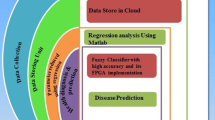Abstract
Advances in Soft Computing have increased the probabilities of implementing mechanisms that are able to predict human behaviour. One of the fields that benefits more from the particular improvements are Digital Forensics. Criminal activity involving smartphones shows interesting behavioural variations that led the authors to create a technique that analyzes smartphone users’ activity and recognizes potentially suspicious patterns according to predefined expert knowledge in actual use case scenarios by the use of fuzzy systems with different configurations.
Access this chapter
Tax calculation will be finalised at checkout
Purchases are for personal use only
Similar content being viewed by others
References
Barmpatsalou, K., Damopoulos, D., Kambourakis, G., Katos, V.: A critical review of 7 years of mobile device forensics. Digit. Invest. 10(4), 323–349 (2013)
Gegov, A.: Fuzzy Networks for Complex Systems: A Modular Rule Base Approach, vol. 259. Springer, Heidelberg (2011). https://doi.org/10.1007/978-3-642-15600-7
Siddique, N., Adeli, H.: Computational Intelligence: Synergies of Fuzzy Logic, Neural Networks and Evolutionary Computing. Wiley, Hoboken (2013)
Stoffel, K., Cotofrei, P., Han, D: Fuzzy methods for forensic data analysis. In: 2010 International Conference of Soft Computing and Pattern Recognition, pp. 23–28 (2010)
Kumar, P.A.R., Selvakumar, S.: Detection of distributed denial of service attacks using an ensemble of adaptive and hybrid neuro-fuzzy systems. Comput. Commun. 36(3), 303–319 (2013)
Shalaginov, A., Franke, K.: Automatic rule-mining for malware detection employing neuro-fuzzy approach. In: Norsk informasjons sikkerhets konferanse (NISK) (2013)
Nyanyo, A., Marques, H., Wickson, P., Brouwer, F., Blaha, M., Jelenc, D., Brouet, J., Junittila, K., Kolundzija, B.: Deliverable 2.3: SALUS use cases final. Technical report, SALUS Consortium (2014)
Wagner, D.T., Rice, A., Beresford, A.R.: Device analyzer: understanding smartphone usage. In: 10th International Conference on Mobile and Ubiquitous Systems: Computing, Networking, and Services, MOBIQUITOUS 2013, Tokyo, Japan (2013)
Fuller, R.: Neural Fuzzy Systems. Abo, Turku (1995)
de Lima, H.P., de Arruda Camargo, H.: A methodology for building fuzzy rule-based systems integrating expert and data knowledge. In: 2014 Brazilian Conference on Intelligent Systems, pp. 300–305 (2014)
Guillaume, S., Charnomordic, B.: Fuzzy inference systems: an integrated modeling environment for collaboration between expert knowledge and data using FISPRO. Expert Syst. Appl. 39(10), 8744–8755 (2012)
Acknowledgments
This work was partially funded by the ATENA H2020 EU Project (H2020-DS-2015-1 Project 700581). We also thank the team of FP7 Project SALUS (Security and interoperability in next generation PPDR communication infrastructures) and the GEPTD officer Nikolaos Bouzis for the fruitful discussions, feedback and insights on in-field investigation practices.
Author information
Authors and Affiliations
Corresponding author
Editor information
Editors and Affiliations
A SMS Datasets Evaluation Metrics
A SMS Datasets Evaluation Metrics
The appendix contains the analytical metrics for all the datasets tested in Sect. 4 as supplementary resources. Table 3 corresponds to the dataset of the second device (Dev. 2), whereas Table 4 refers to the dataset of the third device (Dev. 3).
Rights and permissions
Copyright information
© 2018 ICST Institute for Computer Sciences, Social Informatics and Telecommunications Engineering
About this paper
Cite this paper
Barmpatsalou, K., Cruz, T., Monteiro, E., Simoes, P. (2018). Fuzzy System-Based Suspicious Pattern Detection in Mobile Forensic Evidence. In: Matoušek, P., Schmiedecker, M. (eds) Digital Forensics and Cyber Crime. ICDF2C 2017. Lecture Notes of the Institute for Computer Sciences, Social Informatics and Telecommunications Engineering, vol 216. Springer, Cham. https://doi.org/10.1007/978-3-319-73697-6_8
Download citation
DOI: https://doi.org/10.1007/978-3-319-73697-6_8
Published:
Publisher Name: Springer, Cham
Print ISBN: 978-3-319-73696-9
Online ISBN: 978-3-319-73697-6
eBook Packages: Computer ScienceComputer Science (R0)




